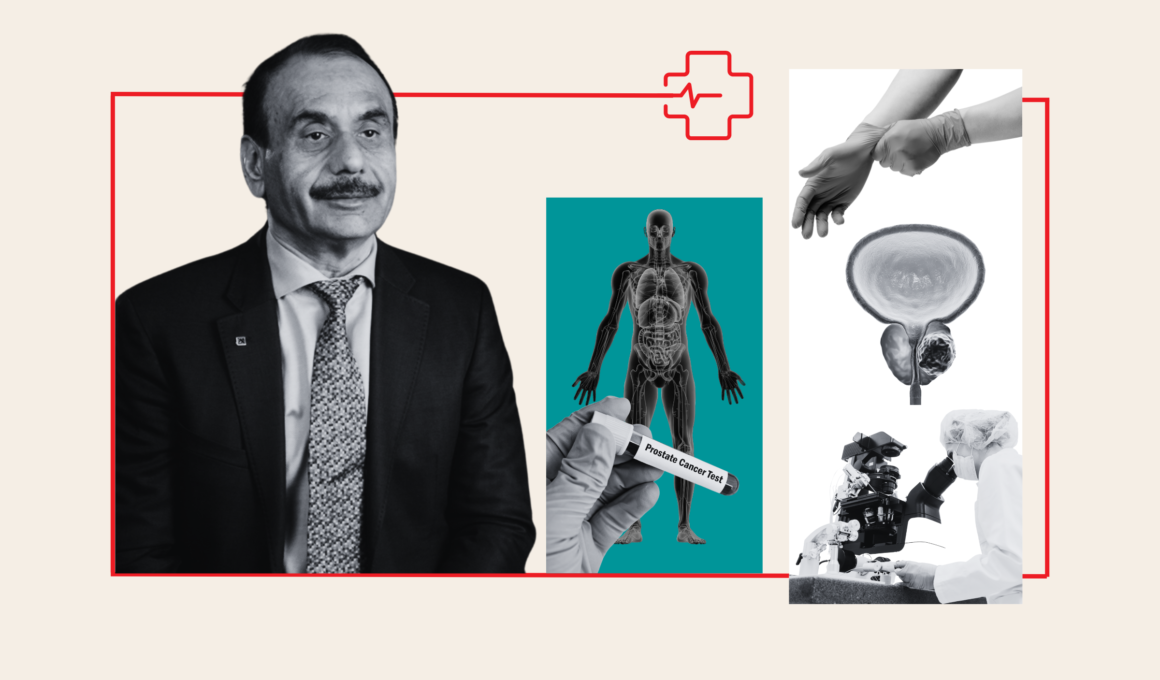Dr. Ashutosh Tewari is the chairman of the Milton and Carroll Petrie Department of Urology at Mount Sinai Hospital in New York City.
As a prostate cancer expert who was featured on Newsweek‘s ranking of America’s Best Prostate Cancer Surgeons 2024, patients often ask him about warning signs of the disease.
But that question, he told Newsweek, is difficult to answer.
More From Newsweek Vault: What Is a Health Savings Account?
“That’s the irony,” Tewari said. “It’s a silent killer.”
He told Newsweek that evidence of prostate cancer won’t show up until it is too late and the cancer has already grown, possibly to the point of being incurable.
“So the message here is don’t expect cancer to declare itself—you should go out and look for it, you should understand the risk,” he said.
More From Newsweek Vault: Compare the Top Health Savings Account (HSA) Providers
If patients wait for symptoms, like difficulty passing urine or blood in the urine, to present themselves, Tewari said the battle can be difficult. But if patients find the cancer early, it is very curable.
Over the last year, prostate cancer has come to the forefront of both domestic and international political news, as both U.S. Defense Secretary Lloyd Austin and King Charles III of England have disclosed their diagnoses.
According to the American Cancer Society, about 288,000 men were diagnosed with prostate cancer in 2023 and about 34,700 of those men died of the disease. The majority of those deaths, Tewari said, were avoidable if the patients had found the cancer early.
“If we find cancer early, we can literally kill it 98.99 percent of the time,” he said.
Unfortunately, Tewari said cancer is often found too late. Prostate cancer is much less treatable once it becomes metastatic and spreads to the bones, lymph nodes or other parts of the body.
“Finding cancer when it is confined within the prostate makes all the difference,” Tewari said. “There are many forms of treatment, and an expert will tell exactly what is suitable for that person, based on that person’s cancer stage, grade and their personal choice.”
Screening for prostate cancer, therefore, is paramount.
Patients can undergo a prostate-specific antigen (PSA) test. According to the National Cancer Institute, PSA is a protein made by both normal and cancerous cells in the prostate gland. The PSA test measures the amount of PSA in an individual’s blood to detect cancer. There are also digital rectal exams, ultrasounds and MRI scans that can be used to screen for prostate cancer.
Men should typically start talking with their urologist about screening for prostate cancer around 45 to 50 years old. But, as with many other cancers, there are special circumstances that might make someone more likely to develop the disease.
Those with a family history of prostate cancer, men with the BRCA, or breast cancer, gene mutation and African American men have a higher risk of developing prostate cancer, Tewari said, and can start those discussions with their doctor around age 40.
One of Tewari’s passions is research into the disparities that occur in prostate cancer. This has led Mount Sinai, named one of the World’s Best Hospitals 2024 by Newsweek, to open a mobile unit that is deployed around New York City offering free prostate cancer screenings.
The Mount Sinai Robert F. Smith Mobile Prostate Cancer Screening Unit launched in April 2022 to address the accessibility issue in prostate cancer screening and the disproportionate occurrence of prostate cancer within the Black community. According to Mount Sinai, Black men are 70 percent more likely to develop high-risk prostate cancer than white men and are more than twice as likely to die of prostate cancer.
The mobile unit is equipped with technology to perform PSA testing, digital rectal exams, an ExactVu micro-ultrasound system, an EchoNous bladder scanner and genomics testing. The goal of the mobile unit is to increase education, awareness and access to testing to help detect prostate cancer early and save lives.
“With Black men at an increased risk of both being diagnosed with and dying from prostate cancer, getting these life-saving resources for testing and treatment into our communities has never been more urgent,” Robert F. Smith, the founder, chairman and CEO Vista Equity Partners, and the mobile unit’s namesake, said in a 2022 press release. “This mobile screening unit will bring awareness and care right into the communities where they are most needed.”
In the last year and a half, Tewari said more than 5,000 patients have been screened through the mobile unit, of which about 16 to 18 percent had abnormal PSA.
“Hopefully these men will have a different outcome just because we found the cancer already,” he said.
One thing Tewari wants people to know about prostate cancer is that the disease “will not come and talk to them.” Men, including those who are high risk, can do a lot to prevent prostate cancer, he said.
In addition to eating right, exercising and avoiding smoking and alcohol, understanding the risk and getting tested can make all the difference.
“Hope is there,” Tewari said, “but we need to find it early, then the discussion starts.”
Uncommon Knowledge
Newsweek is committed to challenging conventional wisdom and finding connections in the search for common ground.
Newsweek is committed to challenging conventional wisdom and finding connections in the search for common ground.







